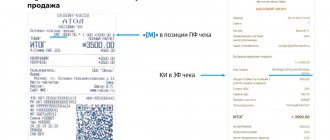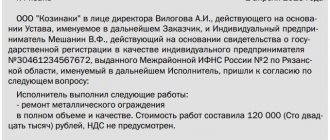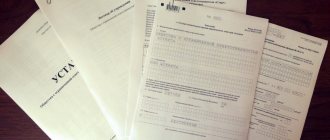When an individual entrepreneur starts working and the first buyers appear, the question immediately arises - how to correctly accept cash from the buyer and what to give him as a confirming document?
I often come across questions like this on the Internet:
- Please clarify your answer. If we do not have a cash register and I can only issue a cash receipt order when selling, could this be a violation from the point of view of the Federal Tax Service? Buyers are satisfied with the receipt for the PKO.
- Is it possible to issue a receipt from the PKO to the client along with the cash receipt? Is it even legal to issue such a document?
- Can I accept payment in cash and issue a cash receipt order? Should I keep any records of these funds and in what form? And also transfer this money to the bank into your current account and how often? If I do not have the right to issue a cash receipt order, is there another possibility of paying for my services in cash?
In short:
A cash receipt order cannot replace a cash receipt. In accordance with the Federal Law of May 22, 2003 N 54-FZ “On the use of cash register equipment when making cash payments and (or) payments using payment cards” it is stated that only the following are equated to a cash receipt: 1. Strict reporting forms, if LLC and individual entrepreneur provide services to the population 2. Sales receipts, receipts, if LLC and individual entrepreneur are payers of UTII. In all other cases, when making cash payments, a cash receipt must be issued.
Thus, using a receipt for PKO in form KO-1 instead of a cash receipt when accepting cash payment for materials sold is illegal.
Can I accept payment in cash and issue a cash receipt order?
You can accept cash payments from individuals, individual entrepreneurs and legal entities. From individual entrepreneurs and legal entities - no more than 100,000 rubles per agreement (Instruction of the Bank of Russia dated June 20, 2007 N 1843-U) From individuals without individual entrepreneur status without limiting the amount and number of agreements. It is not the PKO that is issued from the individual as confirmation of payment, and the BSO The BSO does not replace the PKO. PKO, at the same time, is not a strict reporting form. BSO has certain details listed in the law of May 22, 2003 N 54-FZ “On the use of cash register equipment when making cash payments and (or) payments using payment cards,” which PKO does not have. PKO is a strictly cash document that formalizes a cash transaction.
When a sales receipt is issued that complies with Law 54-FZ
Law No. 54-FZ also provides for an exemption from online cash registers:
- Individual entrepreneur on PSN - meeting the criteria listed in paragraph 2.1 of Article 2 of Law No. 54-FZ.
- Individual entrepreneurs and legal entities that operate in remote or hard-to-reach areas - in accordance with the criteria specified in paragraph 3 of Article 2 of Law No. 54-FZ.
These categories of business entities are required to issue customers or clients, instead of cash receipts, a special document containing the details that are defined in paragraphs 4-12 of paragraph 1 of Article 4.7 of Law No. 54-FZ (LINK). Essentially, these details duplicate those that must be reflected in the online cash register receipt.
The law does not establish how to name the corresponding special document. We have the right to agree to consider it a type of sales receipt. It can be generated on the same check printing device without fiscalization - by setting it up, of course, in such a way that it displays the necessary details on the check.
It may be noted that the legislator has issued a fairly detailed practical guide to filling out “innovative” sales receipts under Law No. 54-FZ (this guide applies to “hard-to-reach” business entities, but by analogy it can also be used by individual entrepreneurs on the PSN). We are talking about the rules for issuing documents without the use of cash registers, which were approved by Decree of the Government of Russia dated March 15, 2017 No. 296 (LINK).
It explains that the sales receipt can be presented in any form convenient for the entrepreneur - handwritten, printed, typographical, and also regulates the rules for issuing such documents (which, by the way, “hard-to-reach” businesses are required to follow, and individual entrepreneurs on the PSN using “innovative » sales receipts - can be guided by them).
Should I keep any records of these funds and in what form?
And now about cash transactions. In accordance with the Regulations on the procedure for conducting cash transactions with banknotes and coins of the Bank of Russia on the territory of the Russian Federation dated October 12, 2011 N 373-P, which entered into force on January 1, 2012, individual entrepreneurs are required to conduct cash transactions and this obligation is not related to the absence the need for cash register for individual entrepreneurs providing services. It is imperative to keep a cash book. A cash book is not a book of a cashier-operator; the latter is used only by those who are required to have a cash register (see Article 2 of the Federal Law of May 22, 2003 N 54-FZ “On the use of cash register equipment when making cash payments and (or) payments using payment cards"). You are not required to have a cash register, but you are required to maintain a cash book. According to clause 1.8. provisions, cash transactions carried out by a legal entity or individual entrepreneur are formalized by incoming cash orders 0310001, outgoing cash orders 0310002. RKO and PKO - cash documents.
When is a traditional sales receipt issued instead of a cash receipt?
The traditional sales receipt is exactly the one that is drawn up in accordance with the recommendations reflected in the above letters from the Ministry of Finance. Previously, such a check was quite actively used to confirm travel and other expenses for reporting - in addition to the usual cash register (generated on a machine with an EKLZ, that is, on an old generation cash register that preceded online cash registers).
With the advent of online cash registers and the introduction of unified receipts (which, provided they are generated in accordance with the law, have undeniable authenticity), the need to use sales receipts to confirm travel and other accountable expenses has disappeared. At the same time, traditional sales receipts remain relevant. Firstly, as a tool alternative to online cash register receipts in cases where a business entity is exempt from its use (and is not obliged to issue any documents to confirm the purchase, but, as we already know, it may be desirable for him to issue something , otherwise the buyer will not understand).
Secondly, traditional sales receipts are prescribed to be used by a separate category of business entities, namely, individual entrepreneurs on PSN, as well as individual entrepreneurs and legal entities on UTII, which, in accordance with paragraph 7.1 of Article 7 of Law No. 290-FZ, have a deferment in the implementation of online cash registers until July 1, 2021. Again, it is useful to refresh your memory of the fact that, as in the case of entities that provide pure services (and are required to use, as we already know, BSO), the preference for not using online cash registers is valid if the criterion for the number of employees is met . That is, this preference is available:
- to all business entities without employees - when carrying out any type of activity;
- for business entities with employees - when carrying out any type of activity, except for trade and catering.
Similarly, without employees there can only be an individual entrepreneur on UTII, since the legal entity will at least have a director.
The specified entities on PSN and UTII are obliged to issue to the buyer or client a sales receipt or other document confirming the purchase, and at the same time complying with the requirements of Law No. 54-FZ as amended on 03/08/2015. In fact, these requirements are reflected in paragraph 2.1 of Article 2 of Law No. 54-FZ as amended. And in essence, they duplicate the details recommended by the Ministry of Finance in the letters cited above. Therefore, when determining the details of a check, you can rely on both Law No. 54-FZ in the old edition and letters from the Ministry of Finance.
Form of strict accountability
BSO is not only a substitute for a check from a cash register, but a document confirming contractual relations in the field of personal services. According to the BSO, you register each receipt of money during the day, and at the end of the day you issue one PKO for the entire amount, indicating in the base - BSO such and such, such and such. You file all BSOs per day into one PKO. Let me add that the receipt from the PKO is issued to the person who hands over the money to the cash register, that is, to the cashier, and if you and the cashier are the same person, you throw away the receipt. BSO must be ordered from a printing house.
Results
A sales receipt is a type of document that primarily confirms the fact of transfer of goods from the seller to the buyer.
The sales receipt form can be developed by an enterprise or individual entrepreneur independently in compliance with the requirements for documents of this type. BSO is defined by law as a document confirming monetary settlements between the seller and the buyer of services. The process of creating a BSO and its mandatory characteristics are strictly regulated by law and differ from the requirements for a sales receipt. Thus, a sales receipt is not a BSO. You can find more complete information on the topic in ConsultantPlus. Free trial access to the system for 2 days.
And also transfer this money to the bank into your current account and how often?
There may be money in the cash register within the limit that you set yourself in the manner prescribed by the above provision No. 373-P, and Everything in excess is surrendered on the day of excess, because, in accordance with clause 1.4. of the specified provision (373-P): “A legal entity or an individual entrepreneur is obliged to keep cash in bank accounts in banks in excess of the cash balance limit established in accordance with paragraphs 1.2 and 1.3 of this Regulation (hereinafter referred to as available funds). Accumulation by a legal entity or individual entrepreneur of cash in the cash register in excess of the established cash balance limit is allowed on days of payment of wages, scholarships, payments included in accordance with the methodology adopted for filling out federal state statistical observation forms, into the wage fund and social payments (hereinafter referred to as other payments), including the day of receipt of cash from a bank account for the specified payments, as well as on weekends and non-working holidays if a legal entity or individual entrepreneur conducts cash transactions on these days. In other cases, accumulation of cash in the cash register in excess of the established cash balance limit by a legal entity or individual entrepreneur is not allowed.” Up to the limit, money can be kept in the cash register as long as you like.
Instead of a cash receipt, do not issue anything (when is this possible and is it worth using)
Not to issue the buyer (client) with any documents in return when receiving payment from him is the full right of business entities, in respect of which Law No. 54-FZ (and related regulations):
- there is a direct exemption from the use of an online cash register (that is, when it cannot be used even if desired);
- the right not to use an online cash register is provided (and at the same time it is not expressly provided for to issue any documents instead of a cash receipt).
Subjects who should not use cash register systems in principle are, in particular, banks (clause 1 of Article 2 of Law No. 54-FZ), owners of mechanical vending machines that accept payment in coin (clause 1.1 of Article 2 of the law).
The main list of entities that have the right, at their discretion, not to use online cash registers (and not to issue any documents in place of a cash receipt) is reflected in paragraph 2 of Article 2 of Law No. 54-FZ (LINK, which will soon be supplemented upon the entry into force of the Draft Law No. 682709-7, passed 3 readings). But there are other categories of persons - which are mentioned, in particular, in paragraphs 2.2, 5, 6, 12 of this article.
The most important part of Bill No. 682709-7 (LINK) is Article 2. It states that individual entrepreneurs who do not have employees have the right not to use online cash registers until July 1, 2021:
- when selling goods of own production;
- when providing services or performing work.
At the same time, the Draft Law does not say anything about the obligations of these individual entrepreneurs to issue any documents instead of cash receipts - thus, the above-mentioned individual entrepreneurs without employees will be able to enjoy preferences for quite some time, similar to those defined for business entities under paragraph 2 of Article 2 of the Law No. 54-FZ.
We also note that until July 1, 2021, business entities named in paragraph 4 of Article 4 of Law dated July 3, 2018 No. 192-FZ (including participants in legal relations) may not use cash registers - if they have the right not to issue a document alternative to a cash receipt in the field of housing and communal services, major repairs, some areas of consumer lending) - LINK.
It should be noted that the very fact of accepting funds from the buyer without issuing any supporting documents in return is a phenomenon that with a high degree of probability will not find understanding, first of all, on the part of the buyer himself. He somehow doesn’t care that the law does not require the seller to issue cash receipts: a person will definitely want to have a document in his hands certifying the purchase.
It is within the power of the seller, exempt from the obligation to use cash registers, to provide such a document without incurring significant financial costs (comparable to those that characterize the content of online cash registers). A similar document, created to maintain trust on the part of the buyer, can be:
- BSO - compiled in the manner prescribed by Decree of the Government of Russia dated May 6, 2008 No. 359 (LINK).
It is necessary to fundamentally distinguish the BSO, compiled according to Resolution No. 359, from the BSO of the online cash register, provided for by Law No. 54-FZ. These two documents are different both technologically and legally. The fundamental difference, first of all, is that BSO online cash registers are just a type of cash register receipt, and not an alternative to it. While BSO according to Resolution No. 359 is just an alternative.
- Sales receipt - containing:
- Document Number;
- date of receipt generation;
- name of the business entity, its tax identification number;
- name, quantity of goods;
- amount to be paid;
- position, full name, signature of the seller.
It is these details that the Ministry of Finance recommends to include in the sales receipt (letters dated 08/16/2017 No. 03-01-15/52653, dated 05/06/2015 No. 03-11-06/2/26028).
At the same time, it is recommended to draw up a BSO if a business entity provides services, and a sales receipt if it sells goods.
The seller can print BSO or sales receipts - to confirm the purchase and maintain customer loyalty, using receipt printers (receipt printing machines - CPM) without fiscalization. They are relatively inexpensive (from 4 thousand rubles), and can quickly generate receipts with the required details - which are very similar to those issued by online cash registers - which makes the buyer not doubt in trusting such documentation.
Sales receipts and BSOs can also be filled out manually by purchasing special forms for this in advance. This is justified if the entrepreneur has few buyers (clients).







